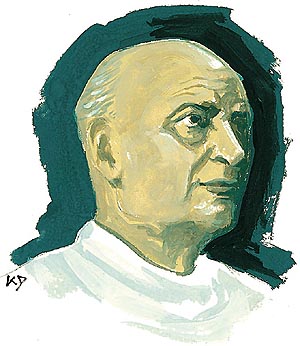WHEN the nation was celebrating the first dawn of independence, Sardar Patel could not afford to relax for he was given the thankless task of integrating the 562 Princely States into the Indian Union. Not many from the younger generation realise that but for Sardar Patel's wise and firm moves, India, instead of being a giant nation, might well have split into many tiny states. The Times, London applauded his role saying that his efforts 'in the integration of the States had won him a place in history and he would rank with Bismark or even higher in this regard.' It is not for nothing that he is called the Iron Man of India.
 Patel was born at Nadiad in the Kaira district of Gujarat. He left for England in 1910, and returned in 1913 as barrister. His practice flourished, but he gave it up in 1919 in order to devote his energies to public work. When he came in contact with Gandhi, he gave up his European attire and he began to mingle with the poor.
Patel was born at Nadiad in the Kaira district of Gujarat. He left for England in 1910, and returned in 1913 as barrister. His practice flourished, but he gave it up in 1919 in order to devote his energies to public work. When he came in contact with Gandhi, he gave up his European attire and he began to mingle with the poor.
After the Chauri Chaura incident, where the police had opened fire on a peaceful procession, and the mob then retaliated by setting fire to a police station and burning to death 21 constables, and one young son of a sub-inspector, Gandhi was so disturbed that he called off the civil disobedience movement for he felt that the nation was not ready for it. Many leaders disapproved of this; Patel was one of the few who stuck with Gandhi.
Patel was appalled by the ill-treatment of the downtrodden. He was disturbed by the plight of Indian women. In a meeting he castigated the people of Bihar for keeping their women in veil. 'Are you not ashamed that you keep your women in purdah. Who are these ladies? Your mothers, your sisters, your wives. Do you really believe that only by keeping them in purdah you can look after their chastity?" He went on to add, "If I could, I would say to these ladies; rather than be wives to such cowardly husbands, divorce them.'
After successfully dealing with the Princely States, he went to Calcutta in 1950 because the Hindus of East Pakistan were being massacred. The situation was explosive with millions of Hindus crossing over to India. Patel dealt with Pakistan firmly on the issue, and the latter agreed to stop the massacre and signed a pact with India.
No comments:
Post a Comment